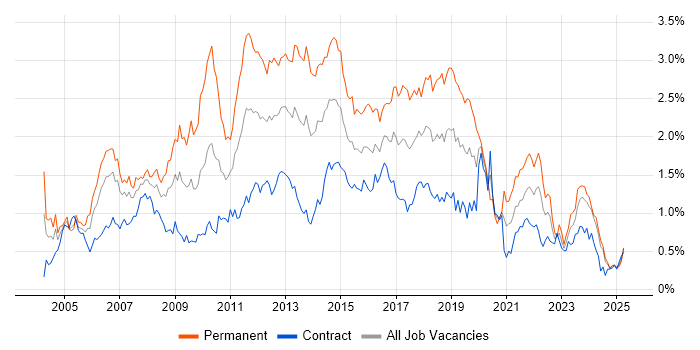Transact-SQL
UK > Scotland
The table below provides summary statistics and salary benchmarking for jobs advertised in Scotland requiring T-SQL skills. It covers permanent job vacancies from the 6 months leading up to 1 March 2026, with comparisons to the same periods in the previous two years.
| 6 months to 1 Mar 2026 |
Same period 2025 | Same period 2024 | |
|---|---|---|---|
| Rank | 104 | 123 | 171 |
| Rank change year-on-year | +19 | +48 | +24 |
| Permanent jobs citing T-SQL | 44 | 13 | 72 |
| As % of all permanent jobs in Scotland | 1.47% | 0.57% | 1.57% |
| As % of the Programming Languages category | 6.66% | 1.64% | 2.78% |
| Number of salaries quoted | 0 | 3 | 36 |
| 10th Percentile | - | £35,600 | £33,563 |
| 25th Percentile | - | £38,375 | £41,146 |
| Median annual salary (50th Percentile) | - | £46,000 | £52,750 |
| Median % change year-on-year | - | -12.80% | +5.50% |
| 75th Percentile | - | £55,125 | £61,250 |
| 90th Percentile | - | £58,800 | £61,500 |
| UK median annual salary | £47,500 | £55,500 | £55,000 |
| % change year-on-year | -14.41% | +0.91% | - |
All Programming Languages
Scotland
T-SQL falls under the Programming Languages category. For comparison with the information above, the following table provides summary statistics for all permanent job vacancies requiring coding skills in Scotland.
| Permanent vacancies with a requirement for coding skills | 661 | 792 | 2,589 |
| As % of all permanent jobs advertised in Scotland | 22.14% | 34.94% | 56.63% |
| Number of salaries quoted | 276 | 459 | 1,028 |
| 10th Percentile | £28,250 | £33,750 | £34,350 |
| 25th Percentile | £35,000 | £42,500 | £42,500 |
| Median annual salary (50th Percentile) | £57,500 | £56,318 | £55,000 |
| Median % change year-on-year | +2.10% | +2.40% | -7.60% |
| 75th Percentile | £73,829 | £72,500 | £68,750 |
| 90th Percentile | £88,750 | £93,778 | £80,000 |
| UK median annual salary | £62,500 | £65,000 | £60,000 |
| % change year-on-year | -3.85% | +8.33% | -7.69% |
T-SQL
Job Vacancy Trend in Scotland
Historical trend showing the proportion of permanent IT job postings citing T-SQL relative to all permanent IT jobs advertised in Scotland.

T-SQL
Salary Trend in Scotland
Salary distribution trend for jobs in Scotland citing T-SQL.

T-SQL
Job Locations in Scotland
The table below looks at the demand and provides a guide to the median salaries quoted in IT jobs citing T-SQL within the Scotland region over the 6 months to 1 March 2026. The 'Rank Change' column provides an indication of the change in demand within each location based on the same 6 month period last year.
| Location | Rank Change on Same Period Last Year |
Matching Permanent IT Job Ads |
Median Salary Past 6 Months |
Median Salary % Change on Same Period Last Year |
Live Jobs |
|---|---|---|---|---|---|
| Stirling | - | 11 | - | - | |
| Edinburgh | +1 | 9 | - | - | |
| Midlothian | - | 6 | - | - | |
| West Lothian | - | 5 | - | - | |
| Fife | - | 5 | - | - | |
| Glasgow | +6 | 4 | - | - | |
| Falkirk | - | 2 | - | - | |
| Clackmannanshire | - | 1 | - | - | |
| East Lothian | - | 1 | - | - | |
| Lanarkshire | - | 1 | - | - | |
| T-SQL UK |
|||||
T-SQL
Co-Occurring Skills & Capabilities in Scotland by Category
The following tables expand on the one above by listing co-occurrences grouped by category. They cover the same employment type, locality and period, with up to 20 co-occurrences shown in each category:
